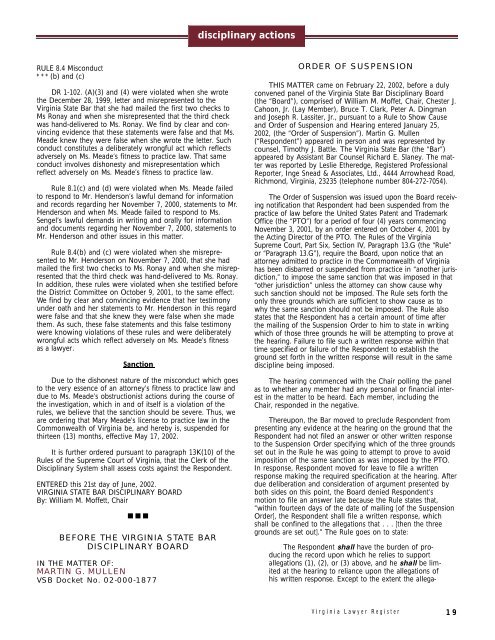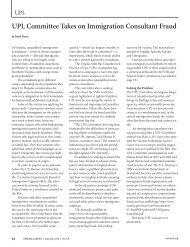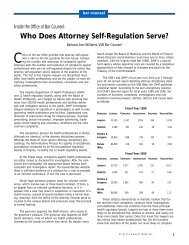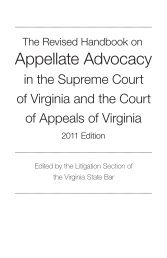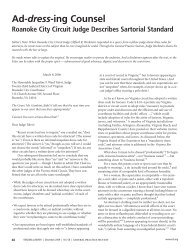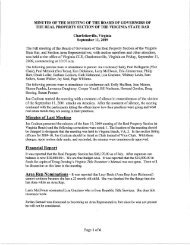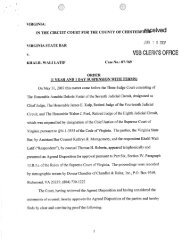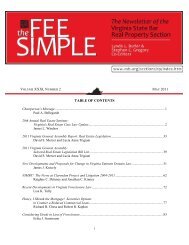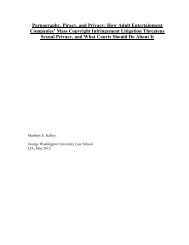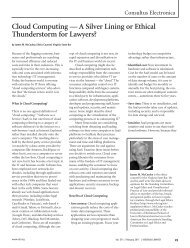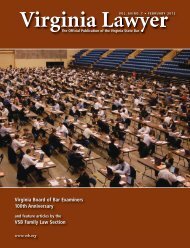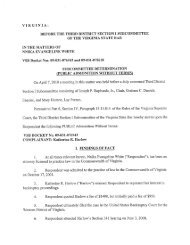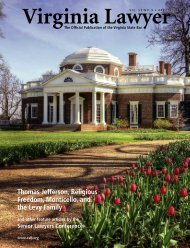Disciplinary Board Disciplinary Actions - Virginia State Bar
Disciplinary Board Disciplinary Actions - Virginia State Bar
Disciplinary Board Disciplinary Actions - Virginia State Bar
Create successful ePaper yourself
Turn your PDF publications into a flip-book with our unique Google optimized e-Paper software.
RULE 8.4 Misconduct<br />
* * * (b) and (c)<br />
DR 1-102. (A)(3) and (4) were violated when she wrote<br />
the December 28, 1999, letter and misrepresented to the<br />
<strong>Virginia</strong> <strong>State</strong> <strong>Bar</strong> that she had mailed the first two checks to<br />
Ms Ronay and when she misrepresented that the third check<br />
was hand-delivered to Ms. Ronay. We find by clear and convincing<br />
evidence that these statements were false and that Ms.<br />
Meade knew they were false when she wrote the letter. Such<br />
conduct constitutes a deliberately wrongful act which reflects<br />
adversely on Ms. Meade’s fitness to practice law. That same<br />
conduct involves dishonesty and misrepresentation which<br />
reflect adversely on Ms. Meade’s fitness to practice law.<br />
Rule 8.1(c) and (d) were violated when Ms. Meade failed<br />
to respond to Mr. Henderson’s lawful demand for information<br />
and records regarding her November 7, 2000, statements to Mr.<br />
Henderson and when Ms. Meade failed to respond to Ms.<br />
Sengel’s lawful demands in writing and orally for information<br />
and documents regarding her November 7, 2000, statements to<br />
Mr. Henderson and other issues in this matter.<br />
Rule 8.4(b) and (c) were violated when she misrepresented<br />
to Mr. Henderson on November 7, 2000, that she had<br />
mailed the first two checks to Ms. Ronay and when she misrepresented<br />
that the third check was hand-delivered to Ms. Ronay.<br />
In addition, these rules were violated when she testified before<br />
the District Committee on October 9, 2001, to the same effect.<br />
We find by clear and convincing evidence that her testimony<br />
under oath and her statements to Mr. Henderson in this regard<br />
were false and that she knew they were false when she made<br />
them. As such, these false statements and this false testimony<br />
were knowing violations of these rules and were deliberately<br />
wrongful acts which reflect adversely on Ms. Meade’s fitness<br />
as a lawyer.<br />
Sanction<br />
Due to the dishonest nature of the misconduct which goes<br />
to the very essence of an attorney’s fitness to practice law and<br />
due to Ms. Meade’s obstructionist actions during the course of<br />
the investigation, which in and of itself is a violation of the<br />
rules, we believe that the sanction should be severe. Thus, we<br />
are ordering that Mary Meade’s license to practice law in the<br />
Commonwealth of <strong>Virginia</strong> be, and hereby is, suspended for<br />
thirteen (13) months, effective May 17, 2002.<br />
It is further ordered pursuant to paragraph 13K(10) of the<br />
Rules of the Supreme Court of <strong>Virginia</strong>, that the Clerk of the<br />
<strong>Disciplinary</strong> System shall assess costs against the Respondent.<br />
ENTERED this 21st day of June, 2002.<br />
VIRGINIA STATE BAR DISCIPLINARY BOARD<br />
By: William M. Moffett, Chair<br />
■ ■ ■<br />
BEFORE THE VIRGINIA STATE BAR<br />
DISCIPLINARY BOARD<br />
IN THE MATTER OF:<br />
MARTIN G. MULLEN<br />
VSB Docket No. 02-000-1877<br />
disciplinary actions<br />
ORDER OF SUSPENSION<br />
THIS MATTER came on February 22, 2002, before a duly<br />
convened panel of the <strong>Virginia</strong> <strong>State</strong> <strong>Bar</strong> <strong>Disciplinary</strong> <strong>Board</strong><br />
(the “<strong>Board</strong>”), comprised of William M. Moffet, Chair, Chester J.<br />
Cahoon, Jr. (Lay Member), Bruce T. Clark, Peter A. Dingman<br />
and Joseph R. Lassiter, Jr., pursuant to a Rule to Show Cause<br />
and Order of Suspension and Hearing entered January 25,<br />
2002, (the “Order of Suspension”). Martin G. Mullen<br />
(“Respondent”) appeared in person and was represented by<br />
counsel, Timothy J. Battle. The <strong>Virginia</strong> <strong>State</strong> <strong>Bar</strong> (the “<strong>Bar</strong>”)<br />
appeared by Assistant <strong>Bar</strong> Counsel Richard E. Slaney. The matter<br />
was reported by Leslie Etheredge, Registered Professional<br />
Reporter, Inge Snead & Associates, Ltd., 4444 Arrowhead Road,<br />
Richmond, <strong>Virginia</strong>, 23235 (telephone number 804-272-7054).<br />
The Order of Suspension was issued upon the <strong>Board</strong> re c e i ving<br />
notification that Respondent had been suspended from the<br />
practice of law before the United <strong>State</strong>s Patent and Tr a d e m a r k<br />
O ffice (the “PTO”) for a period of four (4) years commencing<br />
November 3, 2001, by an order entered on October 4, 2001 by<br />
the Acting Director of the PTO. The Rules of the Vi rg i n i a<br />
S u p reme Court, Part Six, Section IV, Paragraph 13.G (the “Rule”<br />
or “Paragraph 13.G”), re q u i re the <strong>Board</strong>, upon notice that an<br />
a t t o rney admitted to practice in the Commonwealth of Vi rg i n i a<br />
has been disbarred or suspended from practice in “another jurisdiction,”<br />
to impose the same sanction that was imposed in that<br />
“other jurisdiction” unless the attorney can show cause why<br />
such sanction should not be imposed. The Rule sets forth the<br />
only three grounds which are sufficient to show cause as to<br />
why the same sanction should not be imposed. The Rule also<br />
states that the Respondent has a certain amount of time after<br />
the mailing of the Suspension Order to him to state in writing<br />
which of those three grounds he will be attempting to prove at<br />
the hearing. Failure to file such a written response within that<br />
time specified or failure of the Respondent to establish the<br />
g round set forth in the written response will result in the same<br />
discipline being imposed.<br />
The hearing commenced with the Chair polling the panel<br />
as to whether any member had any personal or financial interest<br />
in the matter to be heard. Each member, including the<br />
Chair, responded in the negative.<br />
Thereupon, the <strong>Bar</strong> moved to preclude Respondent from<br />
presenting any evidence at the hearing on the ground that the<br />
Respondent had not filed an answer or other written response<br />
to the Suspension Order specifying which of the three grounds<br />
set out in the Rule he was going to attempt to prove to avoid<br />
imposition of the same sanction as was imposed by the PTO.<br />
In response, Respondent moved for leave to file a written<br />
response making the required specification at the hearing. After<br />
due deliberation and consideration of argument presented by<br />
both sides on this point, the <strong>Board</strong> denied Respondent’s<br />
motion to file an answer late because the Rule states that,<br />
“within fourteen days of the date of mailing [of the Suspension<br />
Order], the Respondent shall file a written response, which<br />
shall be confined to the allegations that . . . [then the three<br />
grounds are set out].” The Rule goes on to state:<br />
The Respondent shall have the burden of producing<br />
the record upon which he relies to support<br />
allegations (1), (2), or (3) above, and he shall be limited<br />
at the hearing to reliance upon the allegations of<br />
his written response. Except to the extent the allega-<br />
V i r g i n i a L a w y e r R e g i s t e r 1 9


